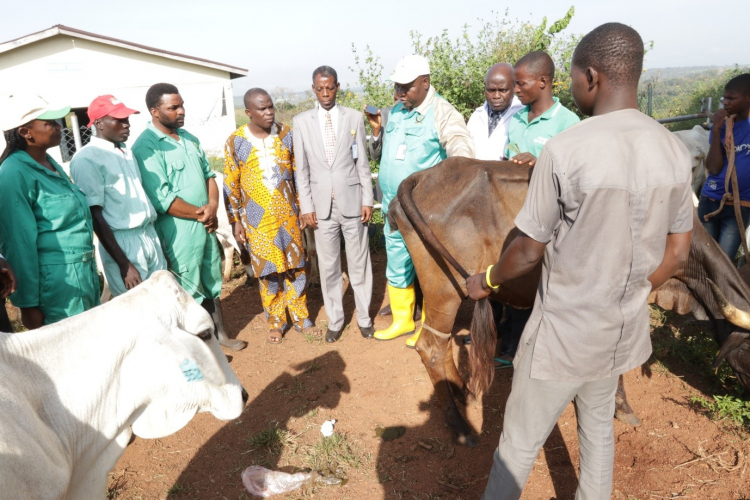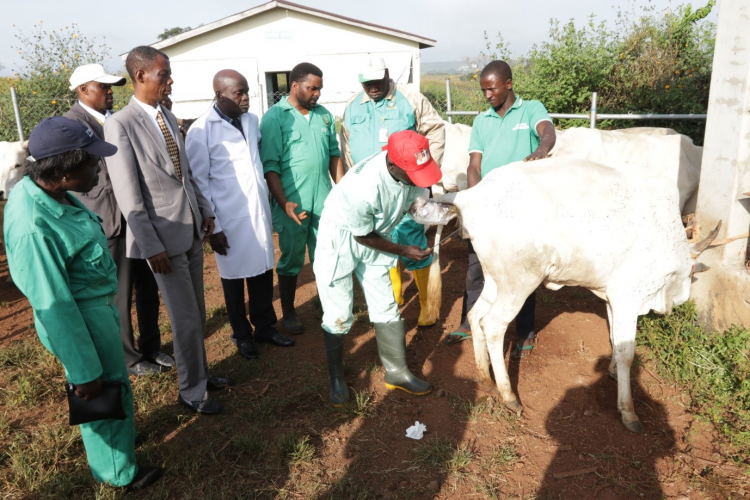
Story of the week
In line with her vision of making food security a reality on the continent of Africa, Landmark University has made a giant stride towards exploring the opportunities in animal biotechnologies to boost milk productivity as it teams up with SMAP Farm, Ibadan. This partnership which was flagged off at the Diary section of the University’s Teaching and Research Farm witnessed the Artificial Insemination (AI) of the cattle with the aim of realizing 100 per cent Friesian cattle breed for high and quality milk production.
The Vice-Chancellor, Professor Adeniyi Olayanju, who was present at the event, acknowledged technology as the driver of development and added that agriculture which is the focus of the University is not an exception. He said that the University is a forward-looking one, seeking and exploring every opportunity to break new grounds. He noted the importance of the Artificial Insemination (AI) process to the University’s vision, he said it would improve the quality and increase the quantity of animal production in the University. He expressed happiness over the prospects inherent in the University’s partnership with SMAP Farm, he said it is a milestone that will make Landmark University a global cynosure of excellence. He, therefore, pledged the University’s continued support for the success of the project.
Speaking on the partnership, the Animal Principal Investigator on the farm, Dr. Ayoola Shoyombo, explained that the University’s partner, SMAP Farm, is one of the beneficiaries of the Farmer2Farmer initiative under FrieslandCampina WAMCO Nigeria’s Dairy Development Programme (DDP) that brings certified farmers from the Netherlands to train Nigerian dairy farmers on best dairy farming practices. He explained further that the intention of the company was to improve dairy farming in Nigeria with the main aim of sourcing at least 10% of the processed milk volume from local producers.
While explaining the process, the Australia-trained embryologist, animal geneticist and breeder, Dr. Shoyombo, said that the Artificial Insemination involves “the synchronization of an animal to come on heat using estrogen and progesterone”. He said that known semen from proven bulls is then introduced to cause fertilization in the synchronized cattle. He noted further that “we have introduced to them pure hosting Friesian semen in this first insemination which will give us 50/50 hybridization. This means 50 per cent of the local breed and 50 per cent of the Friesian breed. The local gene is gradually phased out as we continue this process to the 3rd generation of the cattle. Then we will have 100 per cent Friesian breed cattle. We understand that the gene for milk production is in the male; that is why we use proven bulls. This will help us to improve the genetics of the animals.”
The Dean, College of Agricultural Sciences, Professor Olasunkanmi Bamiro who was also in attendance appreciated Dr. Shoyombo for facilitating the partnership and also the Management of the University led by the able Vice-Chancellor, Professor Olayanju for their continued support for the College in view of more laudable and groundbreaking engagements that will further entrench the name of the University in the annals of agricultural development globally for its impact.
Also present at the event were Professor Adebayo Shittu of the Federal University of Agriculture, Abeokuta (FUNAAB); the Chair, Teaching and Research Farm Board, Dr. Kehinde Adegbite; the Academic Coordinator, Animal Science Programme, Dr. (Mrs.) A.A. Alabi among others.

The Vice-Chancellor, Professor Adeniyi Olayanju (4th R) speaking at the event while others are listening with rapt attention. L-R: the Academic Coordi

Mr. Tajudeen of the SMAP Farm preparing the Friesian semen for insemination while others look on

Mr. Tajudeen of the SMAP Farm inseminating the cow with the Friesian semen
 light rain 25.66oC
light rain 25.66oCGet the latest news and updates by signing up to our daily newsletter.

Story of the week